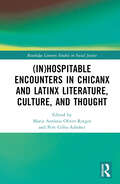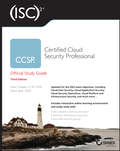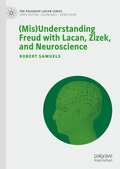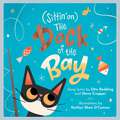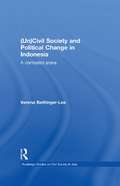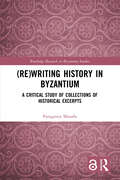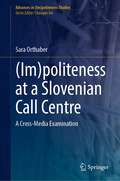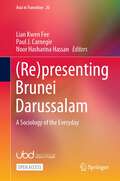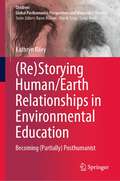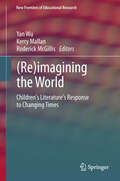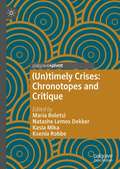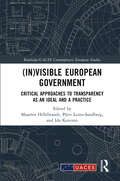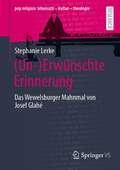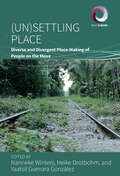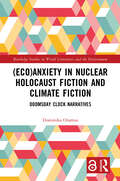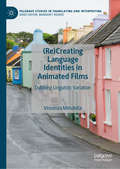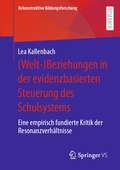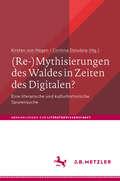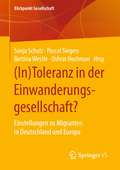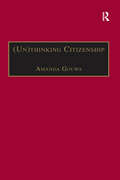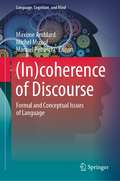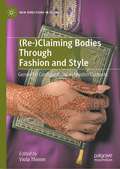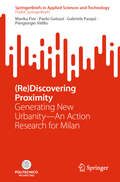- Table View
- List View
**Missing** (Routledge Literary Studies in Social Justice)
by Maria Antònia Oliver-Rotger and Pere Gifra-AdroherThis volume addresses the notion of (in)hospitality in the culture, literature, and thought of Chicanx and Latinx in the United States. It underscores those “stranger others” against whom nativist fear and state violence are directed: undocumented migrants, refugees, and asylum seekers. Critical analyses focus on the topics of immigration and state violence, hospitality in written and visual narratives, and the role of hospitality in the translation of academic and literary works. All essays explore the conditional character of hospitality towards Chicanx and Latinx and its attending myths and discourses. Dwelling on the predicament that individuals and groups face as strangers, unwelcome guests, and unwilling hosts, the essays also explore the ways in which Chicanx and Latinx writers, artists, and filmmakers may or may not challenge the guest-host relationship. The ethical concern that runs through the volume considers material history and the institutional, disciplinary regulation of the uncertainty of hospitality acts as factors determining the narratives about foreign others.
**Missing** (Sybex Study Guide)
by David Seidl Mike ChappleThe only official study guide for the new CCSP exam objectives effective from 2022-2025 (ISC)2 CCSP Certified Cloud Security Professional Official Study Guide, 3rd Edition is your ultimate resource for the CCSP exam. As the only official study guide reviewed and endorsed by (ISC)2, this guide helps you prepare faster and smarter with the Sybex study tools that include pre-test assessments that show you what you know, and areas you need further review. In this completely rewritten 3rd Edition, experienced cloud security professionals Mike Chapple and David Seidl use their extensive training and hands on skills to help you prepare for the CCSP exam. Objective maps, exercises, and chapter review questions help you gauge your progress along the way, and the Sybex interactive online learning environment includes access to a PDF glossary, hundreds of flashcards, and two complete practice exams. Covering all CCSP domains, this book walks you through Cloud Concepts, Architecture and Design, Cloud Data Security, Cloud Platform and Infrastructure Security, Cloud Application Security, Cloud Security Operations, and Legal, Risk, and Compliance with real-world scenarios to help you apply your skills along the way. The CCSP credential from (ISC)2 and the Cloud Security Alliance is designed to show employers that you have what it takes to keep their organization safe in the cloud. Learn the skills you need to be confident on exam day and beyond. Review 100% of all CCSP exam objectives Practice applying essential concepts and skills Access the industry-leading online study tool set Test your knowledge with bonus practice exams and moreAs organizations become increasingly reliant on cloud-based IT, the threat to data security looms larger. Employers are seeking qualified professionals with a proven cloud security skillset, and the CCSP credential brings your resume to the top of the pile. (ISC)2 CCSP Certified Cloud Security Professional Official Study Guide gives you the tools and information you need to earn that certification and apply your skills in a real-world setting.
**Missing** (The Palgrave Lacan Series)
by Robert SamuelsThis book sets out to clarify five key Freudian concepts (the pleasure principle, the primary processes, the unconscious, transference, and the reality principle) elaborated early on in Freud’s work but, it is argued, rarely understood—even by psychoanalysts themselves. It examines in turn the post-Freudian paradigms employed in neuropsychoanalysis, Lacan, Zizek, object relations, and psychoanalytic approaches to identity politics, and in doing so reveals the extent to which they have been distorted and repressed in these new contexts. Over the course of the book the author demonstrates how Freud’s unpublished Project for a Scientific Psychology can be seen as a complete system of core concepts that both ground psychoanalysis in neurology and also introduce a vital challenge to the brain sciences. This book will appeal to students and scholars of psychoanalysis, clinical psychology, and psychoanalytic theory.
**Missing**: A Children's Picture Book (LyricPop #0)
by Steve Cropper Otis ReddingIncluded in Publishers Weekly's Spring 2021 Children's Sneak Previews Otis Redding and Steve Cropper's timeless ode to never-ending days is given fresh new life in this heartwarming picture book. Sittin' in the mornin' sun I'll be sittin' when the evening comes Watching the ships roll in Then I'll watch 'em roll away again, yeah (Sittin' on) The Dock of the Bay is a charming picture book set to one of the King of Soul's™ greatest hits. The song was one of the last Redding recorded, and ranked number four on Billboard's year-end Hot 100 chart, going on to win two GRAMMYs and be certified triple-platinum. With lyrics by Otis Redding and Steve Cropper and illustrations by Kaitlyn Shea O'Connor, this picture book imagines a lonesome cat fishing off a dock and hoping the fish will bite soon. (Sittin' on) The Dock of the Bay is the perfect picture book for parents wanting to share a classic song with their children, allowing both to find joy in it along the way. The Otis Redding Foundation: Redding was dedicated to improving the quality of life for his community through the education and empowerment of its youth. He provided scholarships and summer music programs which continued until his untimely death on December 10, 1967. Today, the mission of the Otis Redding Foundation, established in 2007 by Mrs. Zelma Redding, is to empower, enrich, and motivate all young people through programs involving music, writing, and instrumentation. To learn more, visit: otisreddingfoundation.org
**Missing**: A Contested Arena (Routledge Studies on Civil Society in Asia)
by Verena Beittinger-Lee(Un) Civil Society and Political Change in Indonesia provides critical analysis of Indonesia’s civil society and its impact on the country’s democratization efforts that does not only take the classical, pro-democratic actors of civil society into account but also portrays uncivil groups and their growing influence on political processes. Beittinger-Lee offers a revised categorization of civil society, including a model to define the sphere of ‘uncivil society’ more closely and to identify several subcategories of uncivil society. This is the first book to portrays various uncivil groups in Indonesia, ranging from vigilantes, militias, paramilitaries, youth groups, civil security task forces and militant Islamic (and other religious) groups, ethnonationalist groups to terrorist organizations and groups belonging to organized crime. Moreover, it provides the reader with an overview of Indonesia’s history, its political developments after the democratic opening, main improvements under the various presidents since Suharto’s fall, constitutional amendments and key reforms in human rights legislation. This book will be of interest to upper level undergraduates, postgraduates and academics in political science and Southeast Asian studies.
**Missing**: A Critical Study of Collections of Historical Excerpts (Routledge Research in Byzantine Studies)
by Panagiotis ManafisScholars have recently begun to study collections of Byzantine historical excerpts as autonomous pieces of literature. This book focuses on a series of minor collections that have received little or no scholarly attention, including the Epitome of the Seventh Century, the Excerpta Anonymi (tenth century), the Excerpta Salmasiana (eighth to eleventh centuries), and the Excerpta Planudea (thirteenth century). Three aspects of these texts are analysed in detail: their method of redaction, their literary structure, and their cultural and political function. Combining codicological, literary, and political analyses, this study contributes to a better understanding of the intertwining of knowledge and power, and suggests that these collections of historical excerpts should be seen as a Byzantine way of rewriting history. The Open Access version of this book, available at https://www.taylorfrancis.com/books/9780429351020, has been made available under a Creative Commons Attribution-Non Commercial-No Derivatives 4.0 license.
**Missing**: A Critical Study of Collections of Historical Excerpts (Routledge Research in Byzantine Studies)
by Panagiotis ManafisScholars have recently begun to study collections of Byzantine historical excerpts as autonomous pieces of literature. This book focuses on a series of minor collections that have received little or no scholarly attention, including the Epitome of the Seventh Century, the Excerpta Anonymi (tenth century), the Excerpta Salmasiana (eighth to eleventh centuries), and the Excerpta Planudea (thirteenth century). Three aspects of these texts are analysed in detail: their method of redaction, their literary structure, and their cultural and political function. Combining codicological, literary, and political analyses, this study contributes to a better understanding of the intertwining of knowledge and power, and suggests that these collections of historical excerpts should be seen as a Byzantine way of rewriting history.The Open Access version of this book, available at https://www.taylorfrancis.com/books/9780429351020, has been made available under a Creative Commons Attribution-Non Commercial-No Derivatives 4.0 license.
**Missing**: A Cross-Media Examination (Advances in (Im)politeness Studies)
by Sara OrthaberThis volume covers the field of linguistic (im)politeness in a particular mediated, customer-oriented setting. It is the first book to do so across telephone, email and social media. It offers key insights into a unique customer service setting through authentic and spontaneous data analysis. The book looks at how customers and agents of a large public transport company engage in transactional services and impolite behaviour. This text is directed at scholars and practitioners working in communication, business discourse, (socio)pragmatics, interaction studies, and social media interactions. It is also of great value to students in applied linguistics and scholars of Slavic languages, particularly Slovenian. The cross-media study is also of value to public/private institutions to reflect on their work practices, helping them improve existing customer–service provider relationships. The diverse readership and appeal are essential features of this book.Examines mediated institutional talk and impoliteness in the Slovenian languageCovers mediated service interactions, such as requests and complaints across three different mediaProvides in-depth insights into communication within a contemporary business environment
**Missing**: A Sociology of the Everyday (Asia in Transition #20)
by Noor Hasharina Hassan Paul J. Carnegie Lian Kwen FeeThis thoughtful and wide-ranging open access volume explores the forces and issues shaping and defining contemporary identities and everyday life in Brunei Darussalam. It is a subject that until now has received comparatively limited attention from mainstream social scientists working on Southeast Asian societies. The volume helps remedy that deficit by detailing the ways in which religion, gender, place, ethnicity, nation-state formation, migration and economic activity work their way into and reflect in the lives of ordinary Bruneians. In a first of its kind, all the lead authors of the chapter contributions are local Bruneian scholars, and the editors skilfully bring the study of Brunei into the fold of the sociology of everyday life from multiple disciplinary directions. By engaging local scholars to document everyday concerns that matter to them, the volume presents a collage of distinct but interrelated case studies that have been previously undocumented or relatively underappreciated. These interior portrayals render new angles of vision, scale and nuance to our understandings of Brunei often overlooked by mainstream inquiry. Each in its own way speaks to how structures and institutions express themselves through complex processes to influence the lives of inhabitants. Academic scholars, university students and others interested in the study of contemporary Brunei Darussalam will find this volume an invaluable resource for unravelling its diversity and textures. At the same time, it hopefully stimulates critical reflection on positionality, hierarchies of knowledge production, cultural diversity and the ways in which we approach the social science study of Brunei. ‘I wish to commend the editors for bringing this volume to fruition. It is an important book in the context of Southeast Asian sociology and even more important for the development of our social, geographical, cultural and historical knowledge of Brunei.’ —Victor T. King, University of Leeds
**Missing**: Becoming (Partially) Posthumanist (Children: Global Posthumanist Perspectives and Materialist Theories)
by Kathryn RileyThis book is situated in the simultaneous thinking (theory) and doing (action) of posthumanist performativity and new materialist methodologies to bring forth a multitude of stories that demonstrate co-constituted and co-implicated worldmaking practices.It is written in response to the fact that our Earth is at a critical juncture. As atmospheric temperatures rise and cast unprecedented and wide-spread social and ecological crises across the planet, social and ecological injustices and threats cannot be separated from globalising, neoliberal, capitalist, and colonial discourses that proliferate through anthropocentric and humancentric logics. Manifesting in binary classifications that position the human as separate from the Earth, and dominant categories of the human in hierarchies of power, such logics homogenise and institutionalise the field of environmental education and result in an over-emphasis on instrumentalist, technicist, and mechanistic teaching and learning practices.Exploring the affects emerging within, and between, an assemblage comprising Researcher/Teacher/Environmental Education Worldings, this book seeks to understand how the researcher makes sense of herself with/in the broader ecologies of the world; collaborative processes with an elementary-school teacher in Saskatchewan, Canada, as actualised through four co-created and co-implemented multisensory researcher/teacher enactments (Mindful Walking, Mapping Worlds, Eco-art Installation, and Photographic Encounters); and how the researcher/teacher organises themselves with Land-based pedagogies, environmental education curriculum policy, and wider discourses of Western education. This book does not propose a better way of teaching and learning in environmental education. Rather, showing how difference between categories is relationally bound, this book offers a conceptual (re)storying of human/Earth relationships in environmental education for social and ecological justice in these times of the Anthropocene.
**Missing**: Children's literature's response to changing times (New Frontiers of Educational Research)
by Yan Wu Kerry Mallan Roderick Mcgillis(Re)Imagining the world: Children's Literature's Response to Changing Times considers how writers of fiction for children imagine 'the world', not one universal world, but different worlds: imaginary, strange, familiar, even monstrous worlds. The chapters in this collection discuss how fiction for children engages with some of the changes brought about by new technologies, information literacy, consumerism, migration, politics, different family structures, cosmopolitanism, new and old monsters. They also invite us to think about how memory shapes our understanding of the past, and how fiction engages our emotions, our capacity to empathise, and our desire to discover, and what the future may hold. The contributors bring different perspectives from education, postcolonial studies, literary criticism, cultural studies, childhood studies, postmodernism, and the social sciences. With a wide coverage of texts from different countries, and scholarly and lively discussions, this collection is itself a testament to the power of the human imagination and the significance of children's literature in the education of young people.
**Missing**: Chronotopes and Critique (Palgrave Studies in Globalization, Culture and Society)
by Maria Boletsi Kasia Mika Ksenia Robbe Natashe Lemos DekkerUn)timely Crises explores how ‘crisis’—as a narrative, concept, grammar, and experience—structures time and space. This collectively written volume extends Bakhtin’s ‘chronotope’ to challenge mobilizations of crisis within neoliberal governmentality. The book explores how contemporary crises can trigger memories and traumas of earlier events as well as foster practices of resistance and alternative visions of the future. Drawing from across disciplines and geographical contexts, (Un)timely Crises reimagines the relation of ‘crisis’ with ‘critique’, proposing future trajectories for thinking and living in and through crisis.
**Missing**: Critical Approaches to Transparency as an Ideal and a Practice (Routledge/UACES Contemporary European Studies)
by Päivi Leino-Sandberg Ida Koivisto Maarten HillebrandtThis book questions the theoretical premises and practical applications of transparency, showing both the promises and perils of transparency in a methodologically innovative way and in a cross-section of policy instruments. It scrutinizes transparency from three perspectives - methodologically, theoretically, and empirically - both in the specific context of the EU but also in the wider context of modern society in which transparency is embraced as an almost unquestionable virtue. This book examines the ways in which transparency practices can make institutions visible and stands out for its methodological self-reflection: to fully understand the irresistible call for transparency in our governing institutions, we must reflect on our own relationship with it. This book will be of key interest to scholars and students of transparency studies, democratic legitimacy, global governance, governance law, EU studies and law and public policy more widely.
**Missing**: Das Wewelsburger Mahnmal von Josef Glahé (pop.religion: lebensstil – kultur – theologie)
by Stephanie LerkeAngesichts des Verstummens von Zeitzeug:innen und des Wiedererstarkens fremdenfeindlicher Motive und Mechanismen wie Antisemitismus, Rassismus und Rechtspopulismus ist Erinnerung an den Holocaust aktueller denn je. Gedenkstätten wie die „Erinnerungs- und Gedenkstätte Wewelsburg 1933 – 1945“ nahe Paderborn stellen in der gesellschaftlichen Erinnerungskultur als bildungspolitische Orte zur Erinnerung an die Opfer des Nationalsozialismus und der Mahnung an die leidvollen Ereignisse unter der nationalsozialistischen Diktatur eine notwendige Möglichkeit hierfür dar. Um sich mit dieser politisch sensiblen Geschichte und ihren aktuellen Erscheinungsformen auseinanderzusetzen, bedient sich die Wewelsburg des Ausdrucksmittels Kunst. Als erste umfassende interdisziplinäre Grundlagenforschung befasst sich dieses Buch mit jenem einzigartigen Stück bundesdeutscher Kunstgeschichte nach 1945, einer bildgewordenen, (un-)erwünschten Erinnerung aus einer theologischen Perspektive. Stephanie Lerke zeigt auf, dass das nachkriegsexpressionistische Wewelsburger Mahnmal von Josef Glahé den Betrachtenden durch sein breites Bildprogramm ein komplexes Themenfeld von historischen und theologischen Inhalten mit aktueller, erinnerungspolitischer Relevanz eröffnet. Sie verdeutlicht, wie dieses „zeitlose“ Medium mit seiner Fülle an Interpretationsspielräumen und Gegenwartsbezügen zur individuellen Spurensuche und Auseinandersetzung mit lebendiger Geschichte einlädt.
**Missing**: Diverse and Divergent Place-Making of People on the Move (Worlds in Motion #14)
by Nanneke Winters, Heike Drotbohm and Yaatsil Guevara GonzálezPeople who are “on the move,” particularly migrants and the displaced, often inhabit places that are considered temporary, peripheral, and remote. (Un)Settling Place recentralizes these “out-of-the-way” places as key sites in the shaping of people’s mobility and identities. Ranging from the surveillance and care that migrants experience to the re-creation of social ties and the re-claiming of space, this collection volume seeks to show how a critical approach to in-between place-making can challenge the idea of place as fixed, singular, or one-directional, offering new ways of understanding migrant trajectories.
**Missing**: Doomsday Clock Narratives (Routledge Studies in World Literatures and the Environment)
by Dominika Oramus(Eco)Anxiety in Nuclear Holocaust Fiction and Climate Fiction: Doomsday Clock Narratives demonstrates that disaster fiction—nuclear holocaust and climate change alike—allows us to unearth and anatomize contemporary psychodynamics, and enables us to identify pre-traumatic stress as the common denominator of seemingly unrelated types of texts. These Doomsday Clock Narratives argue that earth’s demise is soon and certain. They are set after some catastrophe and depict people waiting for an even worse catastrophe to come. References to geology are particularly important—in descriptions of the landscape, the emphasis falls on waste and industrial bric-a-brac, which is seen through the eyes of a future, post-human archaeologist. Their protagonists have the uncanny feeling that the countdown has already started, and they are coping with both traumatic memories and pre-traumatic stress. Readings of novels by Walter M. Miller, Nevil Shute, John Christopher, J.G. Ballard, George Turner, Paolo Bacigalupi, Maggie Gee, Ruth Ozeki and Yoko Tawada demonstrate that the authors are both indebted to a century-old tradition and inventively looking for new ways of expressing the Pre-TSS common in contemporary society. This book is written for an academic audience (postgraduates, researchers and academics) specializing in British Literature, American Literature, and Science Fiction Studies.
**Missing**: Doomsday Clock Narratives (Routledge Studies in World Literatures and the Environment)
by Dominika Oramus(Eco)Anxiety in Nuclear Holocaust Fiction and Climate Fiction: Doomsday Clock Narratives demonstrates that disaster fiction— nuclear holocaust and climate change alike— allows us to unearth and anatomise contemporary psychodynamics and enables us to identify pretraumatic stress as the common denominator of seemingly unrelated types of texts. These Doomsday Clock Narratives argue that earth’s demise is soon and certain. They are set after some catastrophe and depict people waiting for an even worse catastrophe to come. References to geology are particularly important— in descriptions of the landscape, the emphasis falls on waste and industrial bric- a- brac, which is seen through the eyes of a future, posthuman archaeologist. Their protagonists have the uncanny feeling that the countdown has already started, and they are coping with both traumatic memories and pretraumatic stress. Readings of novels by Walter M. Miller, Nevil Shute, John Christopher, J. G. Ballard, George Turner, Maggie Gee, Paolo Bacigalupi, Ruth Ozeki, and Yoko Tawada demonstrate that the authors are both indebted to a century- old tradition and inventively looking for new ways of expressing the pretraumatic stress syndrome common in contemporary society. This book is written for an academic audience (postgraduates, researchers, and academics) specialising in British Literature, American Literature, and Science Fiction Studies.
**Missing**: Dubbing Linguistic Variation (Palgrave Studies in Translating and Interpreting)
by Vincenza MinutellaThis book describes the dubbing process of English-language animated films produced by US companies in the 21st century, exploring how linguistic variation and multilingualism are used to create characters and identities and examining how Italian dubbing professionals deal with this linguistic characterisation. The analysis carried out relies on a diverse range of research tools: text analysis, corpus study and personal communications with dubbing practitioners. The book describes the dubbing workflow and dubbing strategies in Italy and seeks to identify recurrent patterns and therefore norms, as well as stereotypes or creativity in the way multilingualism and linguistic variation are tackled. It will be of interest to students and scholars of translation, linguistic variation, film and media.
**Missing**: Eine empirisch fundierte Kritik der Resonanzverhältnisse (Rekonstruktive Bildungsforschung #38)
by Lea KallenbachAusgehend von erheblichen und anhaltenden Wirksamkeitsdefiziten nimmt Lea Kallenbach in der vorliegenden Arbeit eine Perspektiverweiterung auf die evidenzbasierte Steuerung des Schulsystems vor. Dies erfolgt in zweifacher Weise: theoretisch auf der Grundlage der Weltbeziehungssoziologie (Rosa 2016) und empirisch über die Entwicklung und Anwendung eines rekonstruktiven Zugangs. Hierdurch eröffnen sich neue Interpretationswege, die das Nicht-Gelingen evidenzbasierter Steuerung als Schnittstellenproblematik zwischen einzelnen Ebenen des Schulsystems verstehen.
**Missing**: Eine literarische und kulturhistorische Spurensuche (Abhandlungen zur Literaturwissenschaft)
by Corinna Dziudzia Kirsten Von HagenAktuell ist Wald in öffentlichen Diskursen zentral, verbunden mit einer Re-Mythisierung, die zum einen als Effekt einer ökologisch bedingten Krise und zum anderen als Folge einer Primordialität des Digitalen zu lesen ist. Wald ist Anti-Digitalität, weil umfassend sinnlich erfahrbar. Umso mehr sich gerade das Buch in seiner Materialität vom Wald als rohstoffliefernder Grundlage entfernt, wird der Wald Thema in Ecocriticism, Kulturökologie und Nature Writing. Doch der Wald hat immer schon zahlreiche Mythisierungen erfahren, als Schutz- und Inspirationsort ebenso wie als Denkfigur lassen sich zahlreiche Inszenierungsformen beobachten, die von Dante bis zu aktuellen Serien, Filmen und Comics führen. In den nun versammelten Beiträgen einer neuen nachhaltigen Form von Online-Studientagen wird der Ubiquität des Waldes aus einer interdisziplinären Perspektive nachgespürt.
**Missing**: Einstellungen zu Migranten in Deutschland und Europa (Blickpunkt Gesellschaft)
by Pascal Siegers Sonja Schulz Oshrat Hochman Bettina WestleDieser Band versammelt verschiedene Untersuchungen zu Einstellungen zu Migranten und zu nationalistischem Wahlverhalten, die alle auf repräsentativen Bevölkerungsumfragen beruhen. Insgesamt verdeutlicht die Gesamtschau der in diesem Band versammelten Beiträge die Bedeutsamkeit von (positiven) Kontakten zwischen der deutschen Aufnahmegesellschaft und der Migrantenpopulation. Hinweise auf eine allgemeine Verschlechterung des Meinungsklimas gegenüber ethnischen Minderheiten ergeben sich aus den Studien nicht. Sofern Migration nicht als Bedrohung für den eigenen Status wahrgenommen wird, kann verstärkter Kontakt dazu führen, dass die deutsche Bevölkerung insgesamt toleranter und offener wird. Im Gegenschluss kann eine wahrgenommene Bedrohung des eigenen Status und der eigenen Ressourcen zu einer gesellschaftlichen Polarisierung führen. Der Wandel hin zu einer größeren Akzeptanz Zugewanderter ist also nicht irreversibel: Die „offene Gesellschaft“ in der Bundesrepublik muss ständig aktiv erarbeitet werden.
**Missing**: Feminist Debates in Contemporary South Africa (Gender in a Global/Local World)
by Amanda GouwsThe study of citizenship in the context of South Africa implicitly challenges the rights-based democracy in South Africa, while literature regarding women and citizenship has greatly contributed to a new understanding of citizenship. Locally, many global processes are reproduced in the discourse of rights-claiming, issues of institutional representation, bodily integrity in the face of violence, and care in the face of a lack of care. This volume takes the debate of citizenship in South Africa in a more theoretical and empirical direction while engaging with knowledge produced elsewhere in the world. As part of the Gender in a Local/Global World series, it investigates the making of gendered citizenship, institutionalization of gender politics, the state of gendered policy making, local citizenship, rights, the women's movement, gendered violence, as well as citizenship and the body.
**Missing**: Formal and Conceptual Issues of Language (Language, Cognition, and Mind #10)
by Manuel Rebuschi Michel Musiol Maxime AmblardThis present book explores recent advances in modeling discourse processes, in particular, new approaches aimed at understanding pathological language behavior specific to schizophrenia. The contributors examine the modeling paradigm of formal semantics, which falls within the scope of both linguistics and logic while providing overlapping links with other fields such as philosophy of language and cognitive psychology. This book is based on results presented during the series of workshops on (In)Coherence and Discourse organized by SLAM (Schizophrenia and Language: Analysis and Modeling), a project developed to systemize the study of pathological language processing by taking an overarching interdisciplinary approach combining psychology, linguistics, computer science and philosophy. The principle focus is on conversations produced by people with psychiatric disorders such as schizophrenia and autism. The contributions come from young and experienced researchers, and invited speakers. The book appeals to likeminded students and researchers.
**Missing**: Gendered Configurations in Muslim Contexts (New Directions in Islam)
by Viola ThimmThis book investigates ways of dressing, style and fashion as gendered and embodied, but equally as “religionized” phenomena, particularly focusing on one significant world religion: Islam. Through their clothing, Muslims negotiate concepts and interpretations of Islam and construct their intersectionally interwoven position in the world. Taking the interlinkages between ‘fashionized religion,’ ‘religionized fashion,’ commercialization and processes of feminization as a starting point, this book reshapes our understanding of gendered forms of religiosity and spirituality through the lens of gender and embodiment. Focusing mainly on the agency and creativity of women as they appropriate ways of performing and interpreting various modalities of Muslim clothing and body practices, the book investigates how these social actors deal with empowering conditions as well as restrictive situations. Foregrounding contemporary scholars’ diverse disciplinary, theoretical and methodological approaches, this book problematizes and complicates the discursive and lived interactions and intersections between gender, fashion, spirituality, religion, class, and ethnicity. It will be relevant to a broad audience of researchers across gender, sociology of religion, Islamic and fashion studies.
**Missing**: Generating New Urbanity—An Action Research for Milan (SpringerBriefs in Applied Sciences and Technology)
by Gabriele Pasqui Marika Fior Paolo Galuzzi Piergiorgio VitilloThis book explores the topic of proximity and its relations in the design of contemporary urban fabrics and public spaces. The effects of the COVID-19 pandemic and reflections on the future of cities have lately shed light on the concept of proximity, which is intended as the relationship between communities and urban functions and as relations among people, built spaces, and open spaces. The proximity is a historic and fertile field of interest for American and Northern European urban studies; it is a spatial and social program seemingly surpassed by the styles and rhythms of contemporary city life, but today it is back in vogue with different purposes. Meanwhile, the action research developed by the Department of Architecture and Urban Studies at the Politecnico di Milano for the Municipality of Milan reached its conclusion (2018–2020). The research work focused on contextualizing the new M4 Metro line stations under construction, and jointed mobility flows and places, long-range networks and local ones, boosting the idea of metro stations as regenerative urban thresholds and urban platforms for enabling environmental, sustainable settlement, and active mobility systems. In other words, the action research for Milan shows how to achieve the concept of proximity in the urban design practice in a dense, stratified, and complex urban context.
